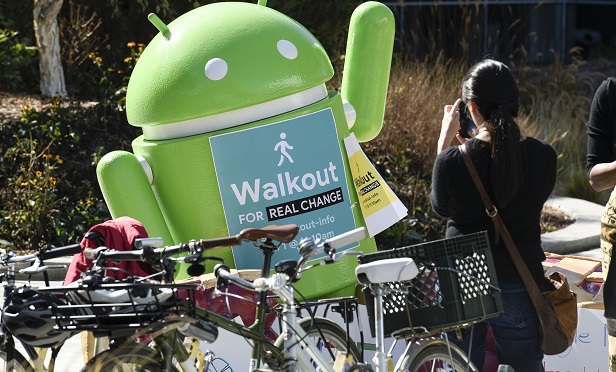 After years as a free-wheeling, fast-growing startup, Google is trying to adjust to the responsibilities and realities of being one of the world's most powerful companies. (Photo: Michael Short/Bloomberg)
After years as a free-wheeling, fast-growing startup, Google is trying to adjust to the responsibilities and realities of being one of the world's most powerful companies. (Photo: Michael Short/Bloomberg)
Google changed some policies on sexual misconduct after thousands of employees walked out of their offices last week to protest big payouts for executives accused of harassment and other misbehavior.
The Alphabet Inc. unit is making arbitration optional for individual sexual harassment and sexual assault claims. It also pledged to provide more information to staff about such investigations and the outcomes, and expand mandatory training on the issue, addressing some of the issues workers asked for in staging the walkout.
Related: 5 questions to help guide the overhaul of your sexual harassment policies
“Going forward, we will provide more transparency on how we handle concerns. We'll give better support and care to the people who raise them. And we will double down on our commitment to be a representative, equitable, and respectful workplace,” Google Chief Executive Officer Sundar Pichai wrote in a public message to employees on Thursday.
The company is holding a town hall staff meeting on sexual harassment Thursday.
After years as a free-wheeling, fast-growing startup, Google is trying to adjust to the responsibilities and realities of being one of the world's most powerful companies. That's happening externally, with increased scrutiny by regulators and politicians, and internally with reports and rising complaints about Google's permissive culture when it comes to executive conduct and relationships with co-workers.
The changes are a step forward, but have some serious shortcomings, said Freada Kapor Klein, a partner at Kapor Capital and longtime advocate for diversity in tech.
“It hasn't ended arbitration, it's made it optional,” she said. The rule change also doesn't appear to extend to workplace racism, which women of color are just as likely to experience as sexism, Kapor Klein said.
The Google protest organizers last week demanded the end of forced arbitration in harassment and discrimination cases, which requires employees to resolve their dispute privately rather than in court.
Mandatory arbitration clauses have come under harsh scrutiny as the #metoo movement has gathered steam over the past year. In February, the attorneys general of all 50 states issued a rare joint letter urging legislation to ensure victims of sexual harassment have the option of a day in court. Some states, including California, this year passed laws that limit the use of non-disclosure agreements in sexual misconduct cases. The California governor, however, vetoed a bill that would have restricted arbitration.
Forced arbitration for harassment claims is still standard practice at major employers, according to Orly Lobel, a labor and employment law professor at the University of San Diego.
Last December, Microsoft Corp. announced that it had eliminated mandatory arbitration clauses for sexual harassment claims among its employees and was also advocating for federal legislation to do the same across the workforce.
“Forced arbitration is one of the ills that we understand keeps sexual harassment in place by concealing the nature of the allegations, and it is a completely one-sided system that favors corporations,” said civil rights attorney Debra Katz, a partner at the law firm Katz, Marshall & Banks. “If we as a society care about eradicating sexual harassment, we need to continue to pressure companies to get rid of these policies, because it's not happening at either the court level or the legislative level now.”
Other worker demands included the creation of a single, clear system to anonymously report harassment and a promise that the chief diversity officer would report directly to the CEO.
Pichai committed to several of those changes, but a request to have an employee representative appointed to the board was not addressed. Instead, Google noted that its chief diversity officer provides recommendations to the board through a committee.
Workers' advocates aren't convinced. The changes don't fully extend to Google contractors, who make up a massive part of the company's workforce, said a spokesperson for the Tech Workers Coalition, which represents employees and contractors from different tech companies. Google said it investigates whenever a contractor makes a complaint against a Google employee, and expects contracting companies to do the same when a complaint is made against a contractor.
Here's what Google is committed to:
- Making arbitration in sexual harassment and assault claims optional.
- Providing regular, detailed reports about the number of harassment claims and whether they resulted in people being fired.
- Publishing an internal guide to how harassment investigations work at the company.
- More support for people reporting harassment, including the right to bring a colleague along with them to meetings with the human resources department.
- Managers will be expected to discourage “excessive” alcohol consumption at work-related events.
- Skipping sexual harassment training will affect employees' performance reviews.
More ways to mitigate sexual harassment in the workplace:
© 2025 ALM Global, LLC, All Rights Reserved. Request academic re-use from www.copyright.com. All other uses, submit a request to [email protected]. For more information visit Asset & Logo Licensing.







